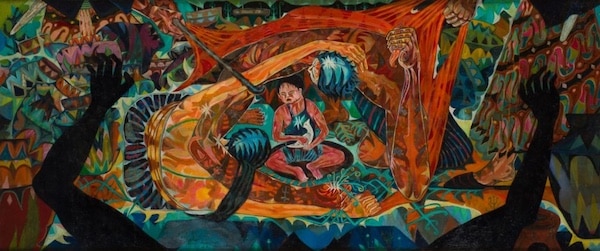Dear friends,
Greetings from the desk of Tricontinental: Institute for Social Research.
Next year is the seventieth anniversary of the Asian-African Conference held in Bandung, Indonesia, in 1955 and attended by heads of government and state from twenty-nine African and Asian countries. Indonesia’s President Sukarno (1901—1970), who had led the freedom movement in Indonesia against Dutch colonialism, opened the conference with a speech entitled ‘Let a New Asia and a New Africa be Born!’, in which he lamented that, while human technical and scientific progress had advanced, the politics of the world remained in a state of disarray. In the seventy years since then (roughly the global average life expectancy), much has been lost and much gained of what was called the Bandung Spirit. Humans have yet to harness the immense power they have in their hands.
The Promethean fire wielded against the people of Africa and Asia in their anti-colonial struggles and against the people of Hiroshima and Nagasaki had created fear. ‘The life of man’, Sukarno said, ‘is corroded and made bitter by fear. Fear of the future, fear of the hydrogen bomb, fear of ideologies’. This fear, Sukarno warned, is more dangerous than weaponry because it drives humans ‘to act foolishly, to act thoughtlessly, to act dangerously’. Yet, he continued, ‘we must not be guided by these fears, because fear is an acid which etches man’s actions into curious patterns. Be guided by hopes and determination, be guided by ideals, and yes, be guided by dreams!’.
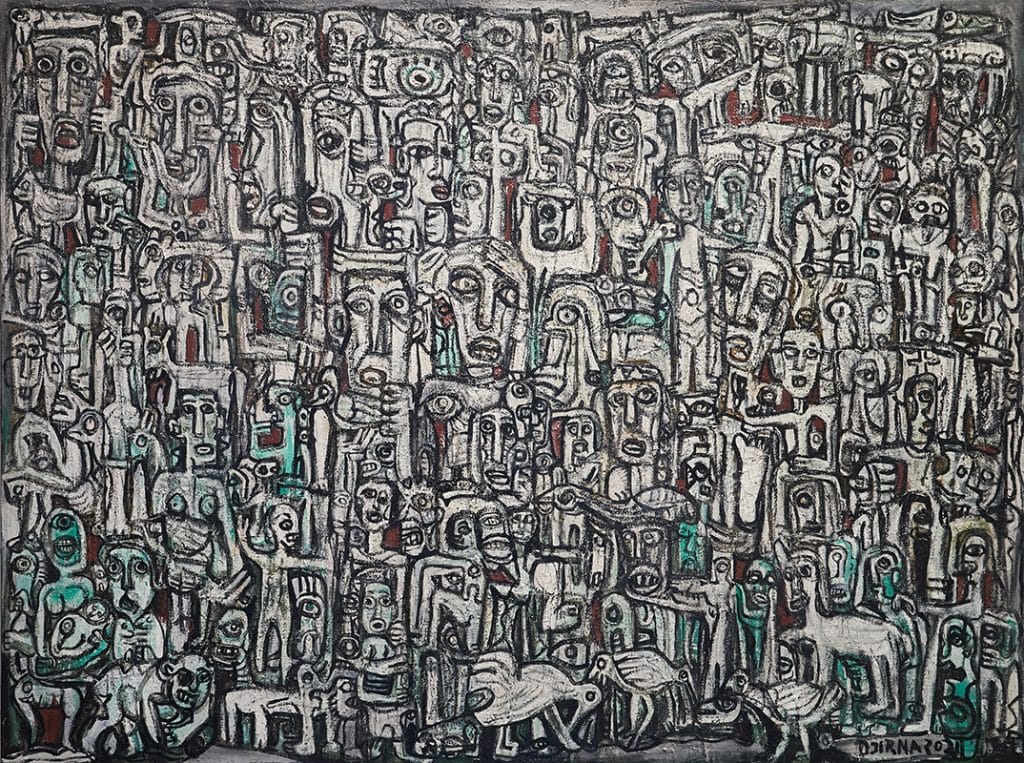
I Made Djirna (Indonesia), Totem Totem, 2021.
The agenda that emerged from the Bandung Conference was clear:
- To end colonialism and to democratise the international political system, including the United Nations.
- To dismantle the neocolonial economic structure, which promoted the dependency of the formerly colonised world.
- To overhaul the social and cultural systems that promoted wretched hierarchies—especially racism—and to build a world society of mutual understanding and international solidarity.
From the late 1950s to the early 1980s, the Bandung Spirit defined the struggles of the Third World Project and made great gains, such as delegitimising colonialism and racism as well as attempting to build the New International Economic Order. But in the vortex of the debt crisis of the 1980s and with the eventual collapse of the USSR, that project died. This collapse can be dated to the International Meeting on Cooperation and Development, which was held in Cancún, Mexico, in October 1981 to discuss the Brandt Report. The meeting failed to produce any substantial commitments and was followed, in August 1982, by Mexico’s default on its external debts.
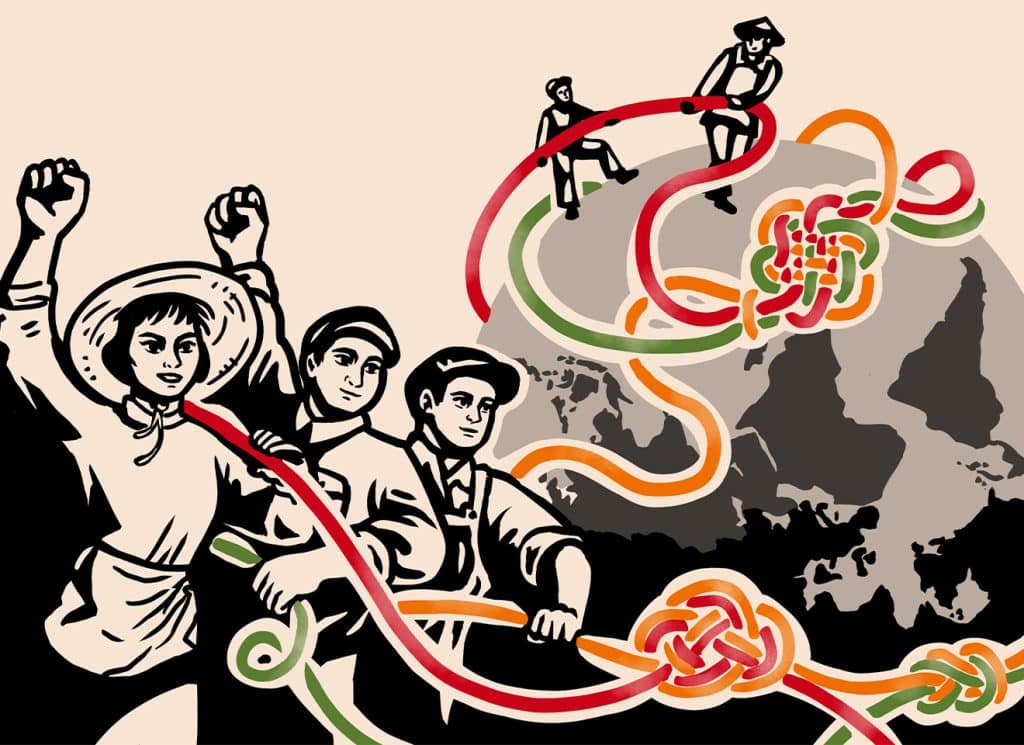
In 2005, fifty years after the Bandung Conference, representatives of eighty-nine countries gathered in Indonesia for the Asian-African Summit of 2005, where they drafted the Declaration of the New Asian-African Strategic Partnership, but the meeting did not gain much visibility, nor was it taken seriously by the ‘international community’. Indonesia had recently emerged out of a ghastly coup regime that ran the country from 1965 to 1998, and then from 1998 it floundered on the rocks of neoliberal policies, including a deepened relationship with the United States. The Indonesian government that hosted the 2005 conference included the forces that had participated in the bloody coup of 1965 against Sukarno. It was not a propitious way to commemorate the original conference, nor to imagine a new agenda for the Global South. Two years prior, the United States had entered a major, illegal war against Iraq, having already invaded Afghanistan, and it appeared at that time that U.S. unipolarity would remain unchallenged indefinitely. Indonesia and the other powers of the Global South were not prepared to challenge the United States. That is why the New Asian-African Strategic Partnership announced at the 2005 summit was merely a hollow echo of the principles of the original Bandung Project, without much emendation, and therefore without any enthusiasm.
Much has changed since both 1955 and 2005. In order to understand the character of these changes, we turn to one of China’s most important left intellectuals, Wang Hui, who is himself a product of the Chinese Revolution of 1949 and the Bandung Spirit. In our latest dossier, , Wang Hui reflects on the importance of reading the history of China and the Global South from their own dynamics, and not in relation to the West as the default point of reference. One hundred and seven years after the October Revolution in the Tsarist empire, seventy-five years after the Chinese Revolution, and nearly seventy years after Bandung, as China and other large states of the Global South position themselves as major powers in the world, Wang Hui’s analysis helps us dive beneath the surface level of events and produce an in-depth theoretical explanation for the rise of China and the Global South.
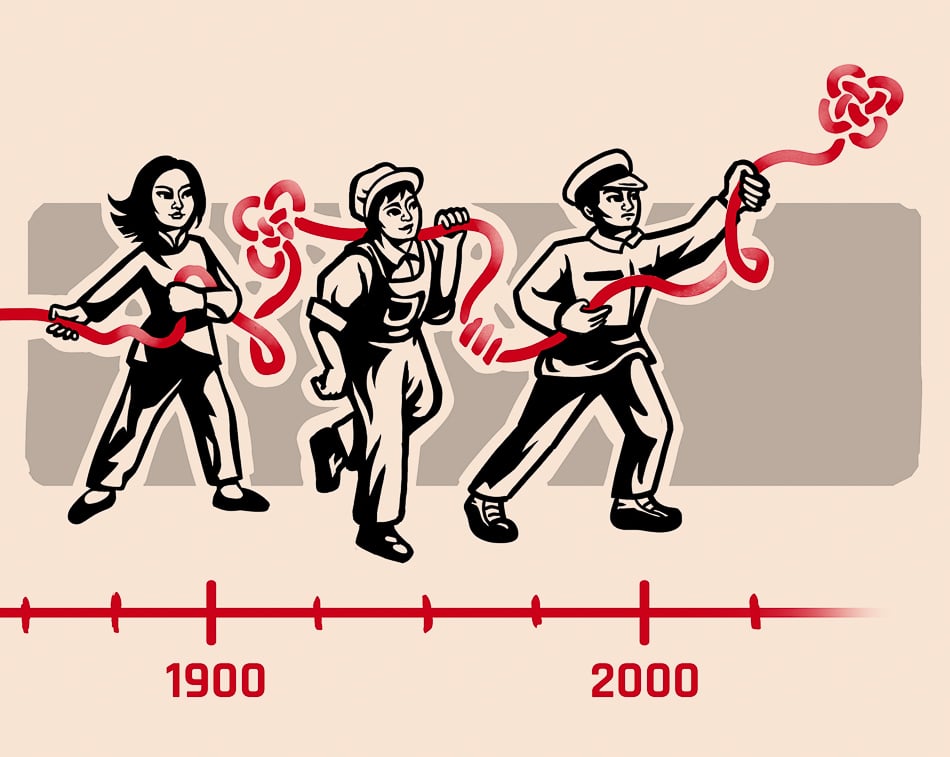
Three points from Wang Hui’s theoretically rich text are of particular interest to this discussion of a world that seeks a new Bandung:
- Revolutions in the periphery. Wang Hui writes that the modern world emerged from two different class-oriented cycles of revolutions. The first, the bourgeois liberal revolutionary cycle, began in the aftermath of the French Revolution of 1789, and the second, the proletarian, anti-colonial, socialist revolutionary cycle, was sparked by the Chinese Revolution of 1911. The second cycle, which drew inspiration more from the Paris Commune of 1871 than from the French Revolution, took place in peripheral areas, in colonised areas, and in the ‘realms of hunger’ (as Pier Paolo Pasolini put it in his 1964 poem ‘L’uomo di Bandung’ or ‘Bandung Man’). In these ‘realms of hunger’, the revolutions formed part of a long process of defeating feudal inheritances, building productive forces, and trying as rapidly as possible to birth a socialist society. Meanwhile, no revolutions took place in the realms of full bellies.
- New concepts for the periphery. Wang Hui looks carefully at the way words are used to describe the Chinese revolutionary process and finds that some that are ‘borrowed’ from the experiences of other countries (Europe’s political history, Marxism, the October Revolution, etc.) are nevertheless developed based on the historical unfolding of China’s own revolution. This is exactly what occurred in other revolutionary experiences, whether in Cuba or in Vietnam. Even those concepts that were borrowed, he points out, are not transplanted without being transformed; they go through, as Wang Hui notes, an act of ‘political displacement’. The Chinese revolutionary process borrowed terms such as ‘people’s war’ and ‘Soviet’, but the actual history of the Chinese people’s war and of the Jiangxi Soviet (1931—1934) is no mirror image of the events which those terms originally described. It is in these experiences, rooted in a different cultural world and sometimes in a different time, that the concepts can be enriched and metamorphosed.
- The post-metropolitan era. Wang Hui argues that we are not merely in a post-colonial period, but a post-metropolitan era. This post-metropolitan condition refers to the fact that the former ‘peasant nations’ are now slowly becoming the focal point of world development, growth, and culture. It is China and the Global South, Wang Hui notes, that are ‘the epochal forces that propelled’ this transition. Yet, the transition is incomplete. The West’s control over finance, resources, science, and technology has weakened, but its control over information and military power has not. That military force, a ghostly presence, threatens the world with great destruction to maintain the influence and power of the metropolitan or core countries.
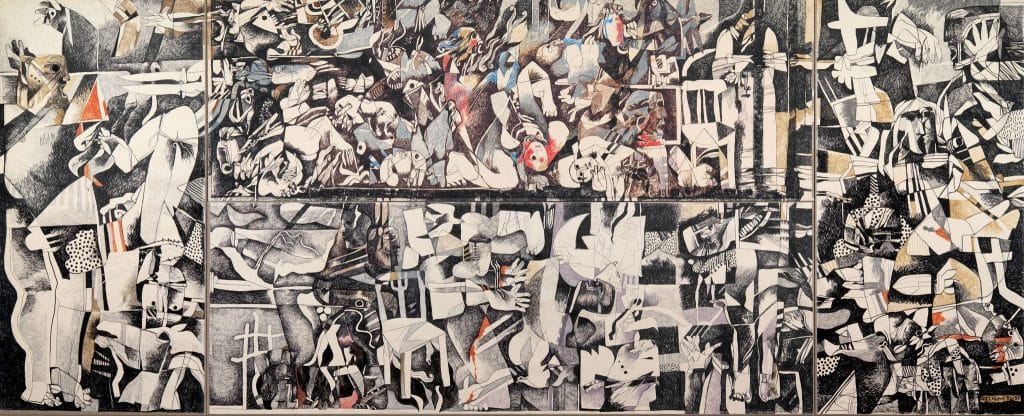
Dia al-Azzawi (Iraq), Sabra and Shatila Massacre, 1982—83.
The journey to a new Bandung has already begun, but it will take time to germinate. Eventually, when we have properly understood the post-metropolitan world, we will be able to develop a new development theory and a new approach to international relations. The gun will not be the first instrument picked up to settle disputes.
In 2016, Hawa Gamodi, a Libyan poet and editor of a children’s magazine, wrote about what poetry can do in the place of carnage:
The world has become a graveyard
But the sun rises
The breeze caresses a girl’s cheek
The sea does not forsake its blue
The swallows tell me of my childhood
Hidden beneath their wings
And somewhere a boy foretastes a kiss from his lover’s lips
These are beautiful images of the other side of devastation, pictures painted in words by a poet who has seen the bombs fall and guns fire at ghosts but kill children. ‘I am writing you’, she continues, ‘my resistance to the ruin / I paint a glorious world / Illuminated by a poem / That they await’.
In some ways, that is the best way to describe these newsletters (of which we have published 348 since 1 March 2018): resistance to the ruin.
Warmly,
Vijay

